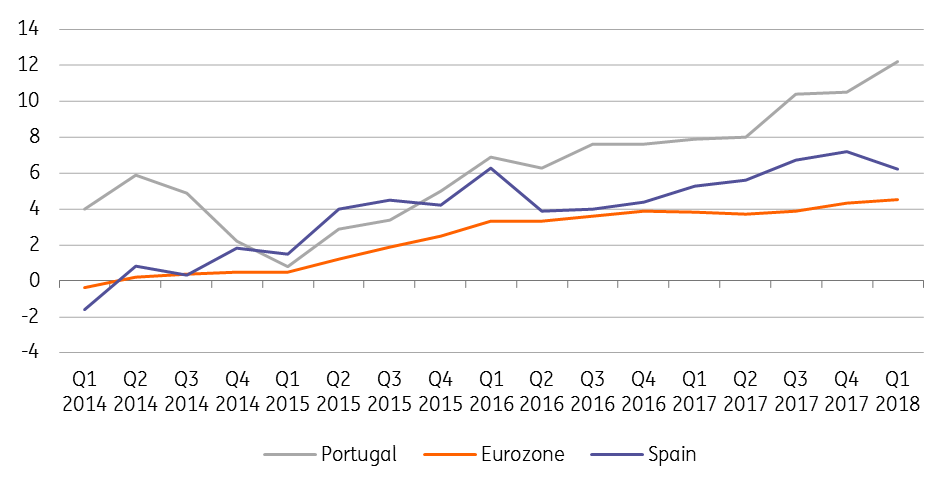Portugal: On track for another good year
The government continues to focus on reducing public debt and the deficit however strong house price growth is becoming a concern. We expect the economy to continue to perform well in 2018, although growth will be slower than last year and forecast annual growth of 2.1% in 2018 and 1.8% in 2019
The discussion about the 2019 budget is ongoing, but it seems the Portuguese government continues to focus on limiting the budget deficit and public debt.
The prime minister António Costa recently said the country should continue to do this to protect itself from external risks, such as a further escalation of the US-China trade war. In 2017, the Portuguese government debt in terms of GDP was the third highest in the Eurozone (125.7%), after Italy (131.8%) and Greece (178.6%). Costa recently said that the aim for 2019 is a deficit of 0.2% of GDP, which is even lower than last year’s 0.9% excluding the one-offs such as the recapitalisation of the public bank Caixa Geral de Depósitos.
The draft budget is expected to be given to the parliament and the European Commission by 15th of October, after which it will be discussed in parliament, while the vote on the bill would take place at the end of November.
In 2017, the Portuguese government debt in terms of GDP was the third highest in the Eurozone (125.7%), after Italy (131.8%) and Greece (178.6%)
In the second quarter, the economy grew by 2.3% year on year, compared to 2.1% in the first quarter. Like the first quarter, net exports contributed negatively to growth, but domestic demand, and in particular consumption and investment, more than compensated. Consumption remains supported by a strong labour market. The unemployment rate continues to drop sharply and reached 6.8% in July. Employment growth has been declining since the beginning of the year but managed to stay above 2%. Soft data, such as consumer confidence and the Economic Sentiment Indicator (ESI) remain at high levels.
The unemployment rate continues to drop sharply and reached 6.8% in July
One issue that gets more and more attention is the sharp increase in house prices, which have been accelerating since early 2015 and reached 12.2% in the first quarter of 2018. This is almost twice as fast than Spain and three times as fast as the Eurozone. The strong growth rate is caused by surging domestic and foreign demand, while supply cannot keep up.
The government could take some measures in its 2019 budget to alleviate the pressure, for example curbing foreign demand by adjusted programs such as the golden visa and the non-habitual regime. However, the prime minister has recently announced that people who return to Portugal in 2019 and 2020 could get a reduction in income tax and discounts on their return trip and housing, which is likely to further exacerbate the problem.
House price growth accelerates

We expect the Portuguese economy to continue performing well in 2018, although growth will be slower than last year. We forecast an annual growth rate of 2.1% in 2018 and 1.8% in 2019.
Download
Download article17 September 2018
ING’s Eurozone Quarterly: A late-cycle economy? This bundle contains {bundle_entries}{/bundle_entries} articles"THINK Outside" is a collection of specially commissioned content from third-party sources, such as economic think-tanks and academic institutions, that ING deems reliable and from non-research departments within ING. ING Bank N.V. ("ING") uses these sources to expand the range of opinions you can find on the THINK website. Some of these sources are not the property of or managed by ING, and therefore ING cannot always guarantee the correctness, completeness, actuality and quality of such sources, nor the availability at any given time of the data and information provided, and ING cannot accept any liability in this respect, insofar as this is permissible pursuant to the applicable laws and regulations.
This publication does not necessarily reflect the ING house view. This publication has been prepared solely for information purposes without regard to any particular user's investment objectives, financial situation, or means. The information in the publication is not an investment recommendation and it is not investment, legal or tax advice or an offer or solicitation to purchase or sell any financial instrument. Reasonable care has been taken to ensure that this publication is not untrue or misleading when published, but ING does not represent that it is accurate or complete. ING does not accept any liability for any direct, indirect or consequential loss arising from any use of this publication. Unless otherwise stated, any views, forecasts, or estimates are solely those of the author(s), as of the date of the publication and are subject to change without notice.
The distribution of this publication may be restricted by law or regulation in different jurisdictions and persons into whose possession this publication comes should inform themselves about, and observe, such restrictions.
Copyright and database rights protection exists in this report and it may not be reproduced, distributed or published by any person for any purpose without the prior express consent of ING. All rights are reserved.
ING Bank N.V. is authorised by the Dutch Central Bank and supervised by the European Central Bank (ECB), the Dutch Central Bank (DNB) and the Dutch Authority for the Financial Markets (AFM). ING Bank N.V. is incorporated in the Netherlands (Trade Register no. 33031431 Amsterdam).